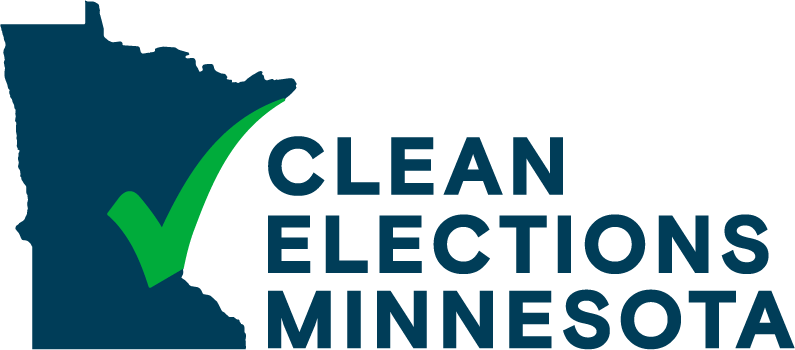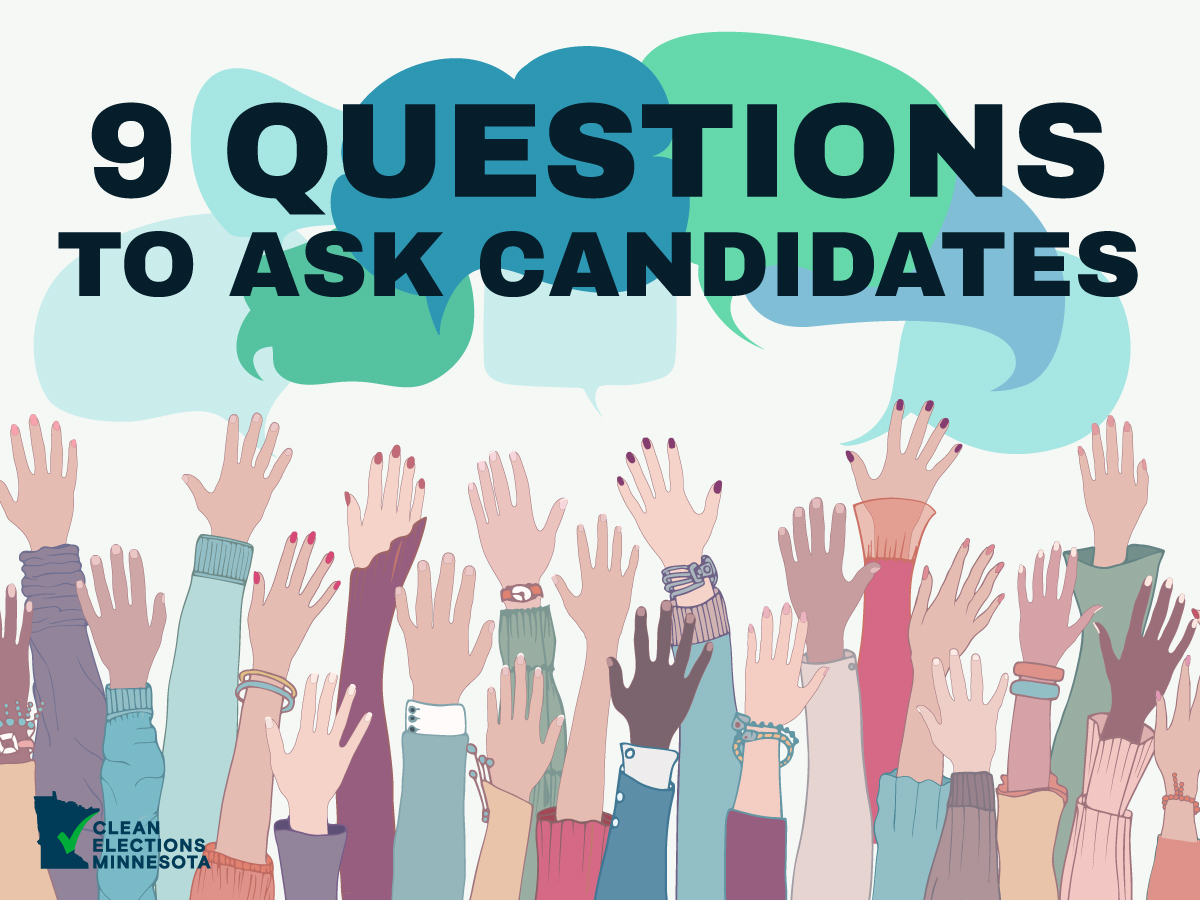Election Deniers are spreading The Big Lie about the 2020 election, sowing the seeds of distrust for this year’s Midterm Election. Worse yet, countless Election Deniers’ names are on ballots at every level across the country. It’s not just Election Deniers who are threatening our democracy, though. Many candidates who understand that there was no rigging involved in the 2020 election still support policies that take away voting rights, further obfuscate the sources of dark money flowing into our elections, and make it more difficult to participate in our democracy.
We’ve compiled a list of questions you can ask candidates at forums and town halls to find out if they support clean elections and want to protect our democracy. If you don’t have a chance to ask candidates these questions in person, you can use the questions and answers as a reference point when browsing policy positions or listening to debates.
How do I contact candidates?
- From Your Sample Ballot: View your sample ballot on the Minnesota Secretary of State’s website. Each candidate’s name links to their campaign website or contact information.
- Through Candidate Filings: Search for an office title or candidate’s name on the Minnesota Secretary of State’s candidate filing website.
- On Social Media: Most candidates have accounts on Facebook, Twitter, and/or Instagram. Search for candidate pages and reach out to them via direct message.
Clean Elections Candidate Q&A
- Do you accept the results of the 2020 election?
- Do you think citizens should be automatically registered to vote while obtaining a driver’s license?
- Do you support keeping our election-day registration for voting?
- Do you support requiring a photo ID for all voters?
- Do you believe that all political contributions should be made public?
- Do you think a constitutional amendment should be adopted to allow the regulation of money in politics?
- Do you think that public financing of elections in Minnesota should be improved?
- Do you think a nonpartisan citizen commission should assist the legislature in redistricting?
Do you accept the results of the 2020 election?
We need elected officials who accept the results and support the peaceful transition of power for our democracy to survive.
Casting doubt on elections has subjected election workers, including 30,000 of our neighbors who serve as election judges, to intimidation and threats. “2020 was the most secure in US History.” Christopher Krebs, Trump administration’s Director of Cyberstructure, Infrastructure and Security Agency, a lifelong Republican. “The election was not stolen by fraud. I haven’t seen anything since the election that changes my mind on that.” William Barr, President Trump’s Attorney General. All claims of widespread fraud have been disproven in court. In Minnesota 3.2 million people voted and during and since the 2020 election, have been only 17 convictions of voter fraud. The system we have works. Our elections are free, secure, and fair.
Acceptable Answer: Yes.
Do you think citizens should be automatically registered to vote while obtaining a driver’s license?
We need elected officials who make it easier to vote, not harder.
Twenty-two states have automatic voter registration. Enacting automatic voter registration policies removes barriers to registration for eligible voters—the first step on the way to increasing voter participation. By registering through a routine and necessary transaction such as those at the DMV, voters don’t have to worry about registration deadlines or application submissions.
Acceptable Answer: Yes.
Do you support keeping our election-day registration for voting?
We need elected officials who make it easy to vote and support our current system. Minnesota is #1 in the country for voter turnout. It’s one of 18 states that has same day voter registration—a system we’ve been using since 1974.
In 2020, 256,000 Minnesotans used same day voter registration. To register at the polls, would-be voters must first produce either a photo ID, a bill showing their name and address, or have a registered voter vouch for them. It’s a felony to falsely swear to a potential voter’s name or address. All voters in Minnesota are verified using a rigorous four step process. In 2021 a bill came close to dismantling this system, and replacing same-day ballots with provisional ballots. With this system, voters would fill out their ballots but they wouldn’t be counted unless they went to their county election offices within one week and satisfied all the new ID requirements for establishing their residence and eligibility. There is already a system in place that verifies eligibility. Adding another step makes it harder to vote.
Acceptable Answer: Yes.
Do you support requiring a photo ID for all voters?
Minnesotans overwhelmingly defeated a voter ID ballot initiative in 2012.
About 7% of the population does not have state-issued identification. These voters are disproportionately low-income, racial and ethnic minorities, the elderly, and people with disabilities. These groups often have difficulty obtaining IDs because they can’t afford it or can’t obtain the underlying documents that are required to obtain a government-issued photo ID. The US General Accounting Office estimates that this prevents about 3% of eligible Minnesotans from casting their votes. Minnesota state law already requires the use of a rigorous data-matching system that verifies the eligibility of each voter through the Statewide Voter Registration System. All voters are verified using a four step process. If their identity and eligibility to vote can’t be verified, they can’t vote.
Acceptable Answer: No.
Do you believe that all political contributions should be made public?
We must adopt legislation to require the full disclosure of all political contributions.
We need to know who is supporting candidates—and to whom our elected officials are indebted—to make informed choices at the polls.
Acceptable Answer: Yes.
Do you think a constitutional amendment should be adopted to allow the regulation of money in politics?
Your bank account should not determine the weight of your vote.
Minnesota should join the 19 states and Washington, DC in calling for a constitutional amendment to protect our elections from foreign money and special interests. In 2010, the US Supreme Court issued the Citizens United decision that reversed century-old campaign finance restrictions and enabled corporations and other outside groups to spend unlimited amounts on elections. This resulted in a massive influx of untraceable corporate and dark money contributions, overwhelming the voices—and financial power—of individuals.
The Minnesota Legislature must pass a resolution asking Congress to propose an amendment to the Constitution that would declare that constitutional rights are the rights of natural persons only and provide that the government may regulate political contributions and expenditures.
Acceptable Answer: Yes.
Do you think that public financing of elections in Minnesota should be improved?
We need to preserve and improve our public subsidy program.
The public subsidy program and political contribution refund programs allow candidates to fund their campaigns without massive donations from private sources or political action committees. This means candidates don’t have already be wealthy to run, or end up indebted to big donors. We need to adopt a public financing system similar to those of Maine and Arizona that allow full public financing to a contribution limit for candidates that forgo large contributions and PAC money.
Acceptable Answer: Yes.
Do you think a nonpartisan citizen commission should assist the legislature in redistricting?
Legislators should not be able to pick their voters.
Minnesota needs an independent and fully transparent commission that follows strict guidelines to recommend how districts should be drawn. Legislators have an inherent conflict of interest and should be removed from the process of drawing district maps. We need to have accurate representation for all voters regardless of political party to make redistricting fair and end gerrymandering.
Acceptable Answer: Yes.
Do you support Ranked Choice Voting?
Let’s be sure that whoever we elect has at least 50% support from voters.
Ranked Choice Voting allows voters to express support for candidates who aren’t endorsed by or members of major parties without being a “spoiler” or “wasted vote”. It reduces negative campaigning and encourages a more diverse candidate pool. With Ranked Choice Voting, your first choice vote always counts for the highest ranked candidate, and your second counts only if your first choice is defeated.
Several Minnesota cities, including Minneapolis and St. Paul, already used Ranked Choice Voting for municipal elections. Let’s join Alaska and Maine and adopt Ranked Choice Voting for all elections, from local to federal.
Acceptable Answer: Yes.


